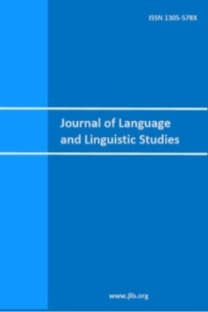Teachers’ perceptions of the role of parental involvement in teaching English to young learners
parental involvement, teachers’ perception, teaching English to young learners, English language teachers, content analysis
___
Akkok, F. (1999). Parental Involvement in the Educational System: To Empower Parents To Become More Knowledgeable and Effective. Paper presented at the Central Asia Regional Literacy Forum, IstanbulAl-Mahrooqi, R., Denman, C., & Al-Maamari, F. (2016). Omani Parents’ Involvement in Their Children’s English Education. SAGE Open, 6(1), 1-12. Author & Co-Author, 2018
Calzada, E. J., Huang, K. Y., Hernandez, M., Soriano, E., Acra, C. F., Dawson-McClure, S., & Brotman, L. (2015). Family and teacher characteristics as predictors of parent involvement in education during early childhood among Afro-Caribbean and Latino immigrant families. Urban education, 50(7), 870-896.
Castillo, R., & Camelo, L. C. (2013). Assisting your child's learning in L2 is like teaching them to ride a bike: A study on parental involvement. GIST Education and learning research journal, 7, 54-73.
Christianakis, M. (2011). Parents as "help labor": Inner-city teachers' narratives of parent involvement. Teacher Education Quarterly, 38(4), 157-178.
Emerson, L., Fear, J., Fox, S., & Sanders, E. (2012). Parental engagement in learning and schooling: Lessons from research. A report by the Australian Research Alliance for Children and Youth (ARACY) for the Family–School and Community Partnerships Bureau: Canberra.
Epstein, J. L., Sanders, M. G., Simon, B. S., Salinas, K. C., Jansorn, N. R., & Van Voorhis, F. L. (2002). School, family, and community partnerships: Your handbook for action (2nd ed.). Thousand Oaks, CA: Corwin Press.
Erdener, M. A., & Knoeppel, R. C. (2018). Parents’ perceptions of their involvement in schooling. International Journal of Research in Education and Science, 4(1), 1-13.
George, D., & Mensah, D. (2010). Parental involvement in homework for children’s academic success: A study in the Cape Coast Municipality. Academic Leadership Journal, 8(2), 34-48.
Gokturk, S., & Dinckal, S. (2017). Effective parental involvement in education: experiences and perceptions of Turkish teachers from private schools. Teachers and Teaching, 24(2), 183-201.
Green, C. L., Walker, J. M. T., Hoover-Dempsey, K. V., & Sandler, H. M. (2007). Parents' motivation for involvement in children's education: An empirical test of a theoretical model of parental involvement. Journal of Educational Psychology, 99, 532–544.
Grolnick, W. S., & Slowiaczek, M. L. (1994). Parents' involvement in children's schooling: A multidimensional conceptualization and motivational model. Child Development, 65, 237–252. http://dx.doi.org/10.1111/1467-8624.ep9406130692.
Hakyemez, S. (2015). Turkish early childhood educators on parental involvement. European Educational Research Journal, 14(1), 100-112.
Hoover-Dempsey, K. V., & Sandler, H. M. (1995). Parental involvement in children's education: Why does it make a difference?. Teachers college record, 97(2), 310-331.
Hoover-Dempsey, K. V., & Sandler, H. M. (1997). Why do parents become involved in their children's education? Review of Educational Research, 67, 3–42.
Kotaman, H. (2008). Türk ana babalarının çocuklarının eğitim öğretimlerine katılım düzeyleri. Uludağ Üniversitesi Eğitim Fakültesi Dergisi, 21(1).
LaRocque, M., Kleiman, I., & Darling, S. M. (2011). Parental involvement: The missing link in school achievement. Preventing School Failure, 55(3), 115-122.
McNeal Jr, R. B. (2014). Parent involvement, academic achievement and the role of student attitudes and behaviors as mediators. Universal Journal of Educational Research, 2(8), 564-576.
Moosa, S., Karabenick, S. A., & Adams, L. (2001). Teacher perceptions of Arab parent involvement in elementary schools. School Community Journal, 11(2), 7-26.
Morgan, V., Fraser, G., Dunn, S., & Cairns, E. (1992). Parental Involvement in Education: how do parents want to become involved?. Educational studies, 18(1), 11-20.
Niehaus, K., & Adelson, J. L. (2014). School support, parental involvement, and academic and social-emotional outcomes for English language learners. American Educational Research Journal, 51(4), 810-844.
Pakter, A., & Chen, L. L. (2013). The daily text: Increasing parental involvement in education with mobile text messaging. Journal of Educational Technology Systems, 41(4), 353-367.
Panferov, S. (2010). Increasing ELL parental involvement in our schools: Learning from the parents. Theory into Practice, 49(2), 106-112.
Ryan, C. S., Casas, J. F., Kelly‐Vance, L., Ryalls, B. O., & Nero, C. (2010). Parental involvement and views of school success: The role of parents' Latino and White American cultural orientations. Psychology in the Schools, 47, 391-405.
- ISSN: 1305-578X
- Yayın Aralığı: Yılda 4 Sayı
- Yayıncı: Hacettepe Üniversitesi
The application of S2R strategies in English reading comprehension by university students in Vietnam
Issra PRAMOOLSOOK, Ahmad Amin DALİMUNTE
Yong WU, Fonny Dameaty HUTAGALUNG, Chew Peng FONG
Language preparatory school students’ use of modern technologies to study English
The metadiscursive aspects of advice giving: hedging and boosting in an agony aunt’s column
The role of literature and literary texts in an EFL context: Cultural awareness and language skills
Chomphu ISARİYAWAT, Chaleomkiet YENPHECH, Kampeeraphab INTANOO
